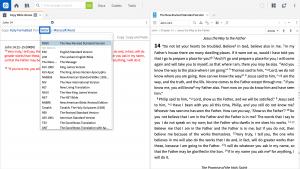Welcome to Day 1514 of our Wisdom-Trek, and thank you for joining me.
This is Guthrie Chamberlain, Your Guide to Wisdom
Bible Study – Formatting Text and Font Styles – Meditation Monday
Wisdom - the final frontier to true knowledge. Welcome to Wisdom-Trek! Where our mission is to create a legacy of wisdom, to seek out discernment and insights, to boldly grow where few have chosen to grow before. Hello, my friend; I am Guthrie Chamberlain, your captain on our journey to increase Wisdom and Create a Living Legacy. Thank you for joining us today as we explore wisdom on our 2nd millennium of podcasts. This is Day 1514 of our Trek, and it is time for Meditation Monday. Taking time to relax, refocus, and reprioritize our lives is crucial in order to create a living legacy. For you, it may just be time alone for quiet reflection. You may utilize structured meditation practices. In my life, Meditation includes reading and reflecting on God’s Word and in prayer. It is a time to renew my mind, refocus on what is most important, and making sure that I am nurturing my soul, mind, and body. As you come along with me on our trek each Meditation Monday, it is my hope and prayer that you, too, will experience a time for reflection and renewing of your mind.
We are continuing our series this week on Meditation Monday as we focus on Mastering Bible Study through a series of brief insights from Hebrew Scholar, Dr. Michael S. Heiser. Our current insights are focusing on what the Bible is. Today let us meditate on:
Bible Study – Formatting Text and Fonts Styles
· Insight Thirty-Five: Pay Attention to the Formatting of Your Bible Translation
No, I’m not recommending that you need a degree in book design for productive Bible study. I am suggesting that you pay attention to how the biblical text is presented in your translation. Believe it or not, Bible publishers use specific formatting conventions to draw the reader’s eye to the text features that do indeed assist in Bible study.
Let’s start with something every English Bible reader has seen but likely not considered: line breaks and indenting. Look at Psalm 1:1-2 in the ESV:
Blessed is the man
who walks not in the counsel of the wicked.
nor stands in the way of sinners,
nor sits in the seat of scoffers;
but his delight is in the law of the LORD,
and on his law, he meditates day and night.
If you read this in today’s Wisdom Journal, notice how the formatting breaks the poem into stanzas, clearly showing which thoughts are in parallel to each other. Proper formatting is crucial for drawing attention to how Hebrew poetry works. Now look at the same passage in the 1769 edition of the King James Version:
Blessed is the man that walketh not in the counsel of the ungodly, nor standeth in the way of sinners, nor sitteth in the seat of the scornful. But his delight is in the law of the LORD; and in his law doth he meditate day and night.

There is no formatting, no line breaks, and indentation, to bring out the parallelisms. The text is presented as simple prose like a historical narrative would be. The symmetry of the lines is completely lost.
Here’s another example. Modern translations segment chapters into pericopes, sections of prose that the grammar of the original text marks off as thought units. Observing the pericope divisions helps Bible students discern the immediate context of a verse within that unit.
So, yes, formatting matters. Don’t just read your Bible. Observe it.
· Insight Thirty-Six: Font Styles Matters
 What difference could font style mean in your Bible study? You’d be surprised.
What difference could font style mean in your Bible study? You’d be surprised.
Let’s talk about italics. Did you know that some English translations use italics to indicate words in the translation that have been supplied for the sake of English but for which no word in the original language exists? For example, Genesis 1:2 reads as follows in many editions of the King James Version:
And the earth was without form, and void; and darkness was upon the face of the deep.
The word “was” is in italics because there is no verb in the Hebrew original behind that English word. It’s supplied for English smoothness. You’ll want to be careful with any Bible interpretation that depends on italicized words.
Small capital letters are used in nearly every English translation, particularly with the name of God. Deuteronomy 6:4 in the ESV reads:
Hear, O Israel: The LORD our God, the LORD is one.
Notice that the word “LORD is spelled with small capital letters. This is a publishing convention to tell the reader that the Hebrew word being translated is the divine name, YHWH (“Yahweh”). This distinguishes the sacred name from the generic word for “lord, master’ in Hebrew, adon. The Bible uses many names for God, and the presence (or absence) of the sacred name can make a difference in the interpretation of a passage.
On those occasions where the divine name and this more generic word occur in tandem. English Bible publishers render the combination as “Lord GOD. Genesis 15:2 is one such instance:
But Abram said, “O Lord GOD ...”
The word adon is translated “Lord5 with normal capitalization, and the divine name, YHWH, is rendered “GOD’ with initial normal capital and the rest with small capitals. “Lord LORD would just sound awkward.
The takeaway is that sometimes your translation is giving you information hidden in plain sight. Everything you see on the page has a decision behind it.
Joshua 1:8
Study this Book of Instruction continually. Meditate on it day and night so you will be sure to obey everything written in it. Only then will you prosper and succeed in all you do.
That is a wrap for today’s Meditation. Next week we will continue our trek on Meditation Monday as we take time to reflect on what is most important in creating our living legacy. On tomorrow’s trek, we will explore another wisdom quote. This 3-minute wisdom supplement will assist you in becoming healthy, wealthy, and wise each day. Thank you for joining me on this trek called life. Encourage your friends and family to join us and then come along tomorrow for another day of ‘Wisdom-Trek, Creating a Legacy.’ 
If you would like to listen to any of the past 1513 daily treks or read the daily Journal, they are available at Wisdom-Trek.com. I encourage you to subscribe to Wisdom-Trek on your favorite podcast player so that each day will be downloaded to you automatically.
Thank you for allowing me to be your guide, mentor, and most importantly, I am your friend as I serve you through this Wisdom-Trek podcast and Journal.
As we take this Trek of life together, let us always:
- Live Abundantly (Fully)
- Love Unconditionally
- Listen Intentionally
- Learn Continuously
- Lend to others Generously
- Lead with Integrity
- Leave a Living Legacy Each Day
I am Guthrie Chamberlain….reminding you to ’Keep Moving Forward,’ ‘Enjoy your Journey,’ and ‘Create a Great Day…Everyday’! See you tomorrow!